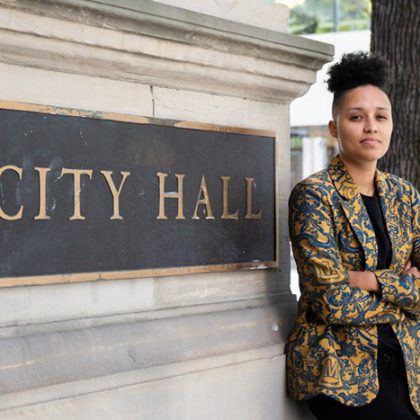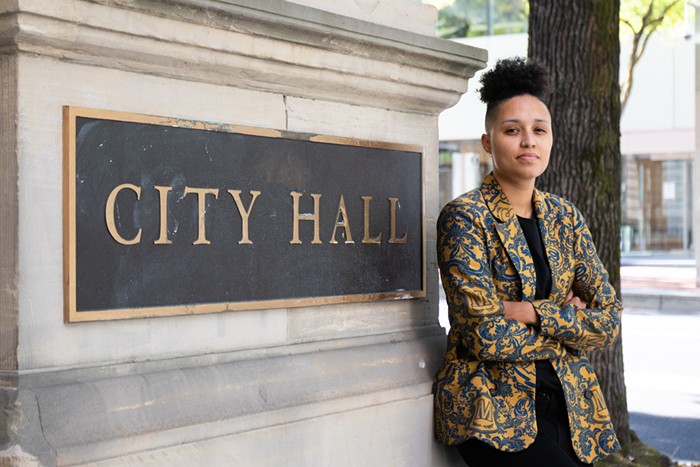Feature your business, services, products, events & news. Submit Website.
Breaking Top Featured Content:
Q & A with Jamila Dozier, the Portland Housing Advocate Running Against Dan Ryan


In just over six months, Portlanders will be dropping ballots in the mail to vote on city elections. That May 17 election will see three seats up for grabs: City Commissioner #2 (currently held by Commissioner Dan Ryan), City Commissioner #3 (currently held by Commissioner Jo Ann Hardesty) and City Auditor. City Auditor Mary Hull Caballero isn’t running for re-election, but both Ryan and Hardesty are both campaigning to keep their seats for another term. Challengers have begun to slowly emerge in both council races, bringing both new and familiar names to the table. One of those new contenders: Jamila Dozier.
Dozier was the first person to submit her intent to run for Ryan’s council seat with the city elections office. Two others have since joined the race: conservative videographer Brandon Farley and a relatively unknown candidate named Avraham Cox.
We spoke with Dozier about what attracted this political newcomer to join the race this week. (The following conversation has been edited for clarity).
Mercury: Tell me a little about yourself. Where are you from?
Dozier: I was born and raised in and around San Francisco, mostly in a coastal town called Pacifica. I went to Sonoma State University for undergrad. After that, I knew I wanted to move to Portland for grad school.
Why Portland?
In March 2012 I travelled here on a school trip over Spring Break, where we spent time working with community-based organizations addressing food and housing insecurity. I was introduced to Sisters of the Road, to Transition Projects, to Habitat for Humanity. And I just fell in love with the city. At face value, in 2012, it seemed like Portland was doing a much better job of caring for the unhoused than San Francisco. Seeing all the homeless services downtown co-existing with the rest of downtown businesses—in San Francisco, services were in segregated areas of the city. Areas you were told not to go to. Here, it felt different.
What did you focus on in graduate school?
I pursued a masters in higher education at Lewis & Clark. I wanted to identify meaningful ways to bridge the gap between K-12 and higher education, especially for students of color. I’m a first generation college student, and I wanted to show other kids of color that it was possible for them. While at Lewis & Clark, I did a lot of policy work around Title IX at the college—this was right after Betsy DeVos was made Secretary of Education and went after Title IX. That work led to being trained to be a Title IX investigator on campus. In 2017, I was appointed to the Oregon Attorney General’s Sexual Assault Task Force. It’s something I care deeply about.
What do you do for work now?
I’m the East Portland housing coordinator for the Portland Housing Bureau. I’ve been working on the city’s anti-displacement strategy and housing stabilization programs in East Portland.
So, let’s get to the elephant in the room: What inspired you to run for Portland City Council?
I always knew I wanted to run for office one day. It was just a matter of when and where. To be honest, I’ve grown really frustrated with the way things have been going since I moved here. The tipping point for me was the pandemic. It has highlighted and exacerbated issues that have existed in this city for a long time that have been ignored. Especially with housing. Seeing so many more people unhoused due to this financial crisis is disheartening. It’s hard seeing the pain and sadness while also seeing a bunch of brand new apartment buildings being built that are half-empty.
A lot of my work at the Housing Bureau has been COVID-related. I’ve been overseeing the rental assistance program, and it just feels like a Band-Aid at this point. We’re putting the inevitable off… we’re not asking, “What are we going to do to get out of this?” This is a pivotal time for Portland to become resilient. We have an opportunity for Portland to set the precedent on how to actually care for people in times of crisis in a way that is sustainable. I believe I bring a lens that’s missing at City Council with both my lived experiences and professional experiences.
Can you tell me more about those lived experiences?
I experienced houselessness and food security many times throughout my life—from childhood through adulthood. I know what it’s like to live out of your car and couch-surf when you don’t have an income. I know what it’s like when your parent loses a job and you have to move into a hotel.
And identity-wise, I identify as a queer, non-binary, bi-cultural, Afro-Latina. Spanish was my first language. My mother is native Puerto Rican and my father is Black. These identities really guide the work that I do.
There are two council seats open in the May election. Why did you chose to run against Dan Ryan?
I don’t see it running against anyone… I’m just running for an open seat that happens to have an incumbent. I believe that [Ryan’s] portfolio aligns the most with my experience and my passion.
What do you think is currently missing in the city’s approach to homelessness and housing?
I’m an advocate for housing first, and for supportive services to keep people in housing. I know there are some investments in that, but it’s been very slow-moving in the city in terms of solutions. I think the tiny home villages in inner Southeast are a great initiative, and I’m glad the city prioritized hygiene stations. But I don’t think there are enough. As we know, a lot of folks that are unhoused are experiencing mental health needs. That’s why I support the Portland Street Response as an opportunity to remove weapons and force from a situation to support people who are in crisis, but it hasn’t been fully backed by City Council.
That brings us to the police. The role that police play in Portland has been a central discussion in City Hall for the past year. What is your stance on policing in Portland?
I believe in a community-centered approach to law enforcement. Communities, especially communities of color, don’t trust the police, and for very good reasons. I believe the Portland Police Bureau needs to be demilitarized. The way they have behaved in the past year, especially in regards to protests, it’s frankly ridiculous. The fact that the federal police are allowed to terrorize our city… the fact that the Proud Boys are allowed to come in our city and there are no repercussions… but when people are protesting in the streets for the good of Portland, they’re met with violence. That’s wrong.
Of course crime is up in this city because people are angry, people are in pain, and things aren’t getting better. But I do not believe that the police need to respond to everything. At some point, we need to focus on preventing crime instead of just responding to it. That kind of prevention comes from the community. We need to invest in our community in other ways, and actually listen to the community. My hope in this race is to center Portlanders in all decisions. As commissioner, I won’t just be accountable to bureaus in my portfolio, I’ll be accountable to Portlanders first, especially Portlanders living on the margins because they’ve been ignored for so long.
What does community engagement look like to you? What work will you do to make sure you’re representing all Portlanders?
I’ll tell you what I don’t want to do first: I don’t want to host more forums or feedback sessions. I don’t want people to tell me the same things they’ve been telling City Council for years, with no changes. I want to do. I want to put action behind what people have said they’ve needed. I have participated in listening sessions and seen nothing come from them. What the community needs is not another set of broken promises, they need to trust that someone will amplify their voice. For me, that means relationship-building in new communities, being involved in community events, and doing what I can to support community members. A lot of people of color don’t feel comfortable speaking before City Council. My goal is to flip the narrative, to create pathways for all Portlanders to participate in politics and have their voices heard. That starts with going to them, not waiting for them to come to City Hall.
Are there any other issues you’d like to prioritize if elected?
I want to see some changes in our transportation system. Depending on where you live in Portland, it can be pretty inaccessible to get around. We need more transit centers. We need sidewalks, more bike lanes, and more street lights everywhere—I see how this impacts people living in East Portland all the time. We need to see an equitable commitment to transportation. I’d also like to focus on community wellness, which to me means equitable access to green spaces wherever you live in the city. I want people to feel safe getting outside in their neighborhood.
Continue Reading at PortlandMercury.com here


